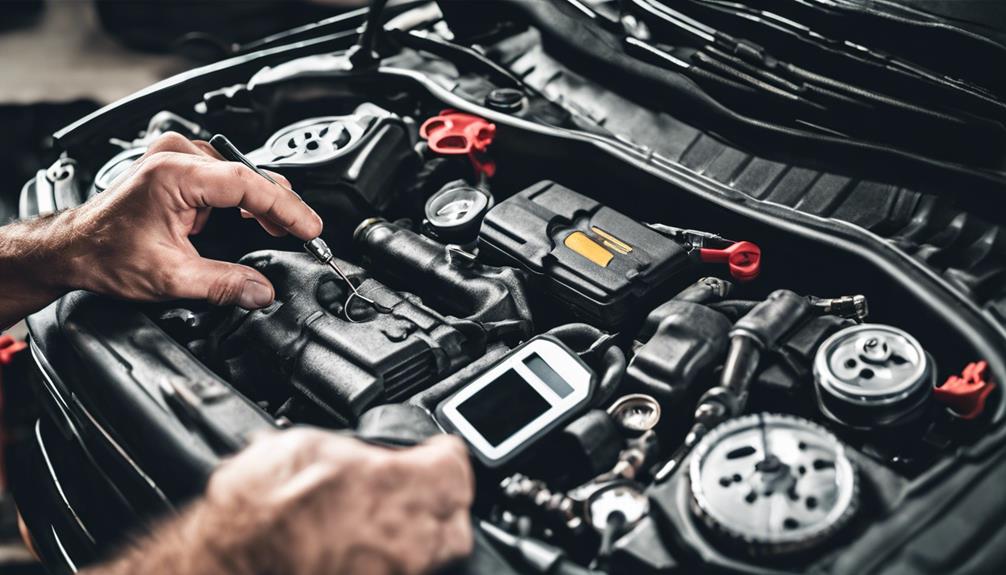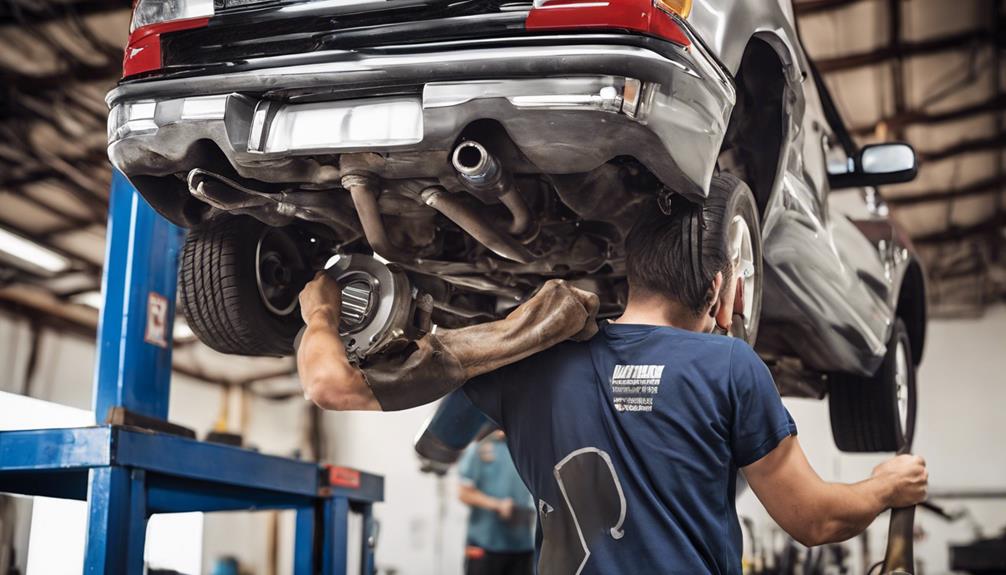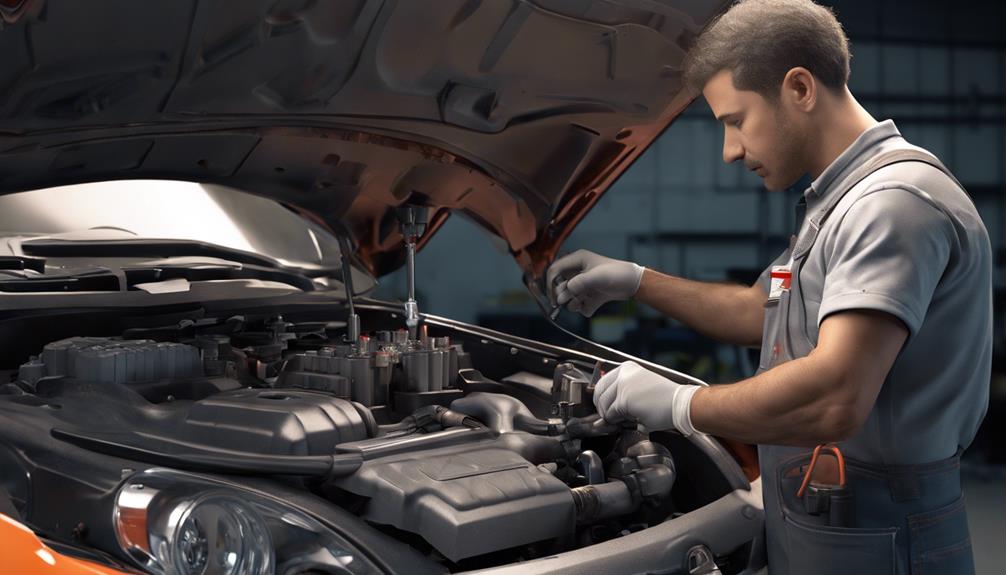In McAllen, TX, did you know that up to 70% of vehicle breakdowns are attributed to engine-related issues? Understanding the importance of timely engine diagnostics and repairs can significantly impact the performance and longevity of your vehicle. By following a systematic approach to identifying and addressing engine problems, professionals in McAllen, TX can ensure efficient solutions that keep your car running smoothly. Whether it’s a mysterious warning light or a subtle change in engine performance, knowing where to turn for reliable diagnostics and repairs is crucial for every vehicle owner.
Key Takeaways
- Initial assessment guides diagnostic steps for precise repairs.
- OBD-II scanner aids in accurate issue identification.
- Multimeter tests ensure thorough diagnosis and effective solutions.
- Compression analysis pinpoints root causes for optimal engine performance.
Importance of Engine Diagnostics
The utilization of engine diagnostics is imperative in modern vehicle maintenance practices to swiftly and accurately identify potential engine-related issues. In McAllen TX, vehicle owners understand that regular engine diagnostics are essential for maintaining optimal performance and extending the engine’s lifespan. By utilizing onboard computer systems, mechanics can efficiently analyze and diagnose any potential issues that may affect the engine. Through timely repairs based on these diagnostics, minor problems can be addressed before they escalate into more significant and costly issues. This proactive approach not only ensures peak performance of the vehicle but also contributes to the overall longevity of the engine. Thus, in McAllen TX, the significance of engine diagnostics cannot be overstated in keeping vehicles running smoothly and efficiently.
Common Signs of Engine Troubles
Common signs of engine troubles can manifest through warning lights flashing on the dashboard or strange engine noises. Warning lights serve as indicators of potential issues that require immediate attention, while unusual sounds may point to underlying problems within the engine components. Understanding these signs can help diagnose and address engine troubles promptly to prevent further damage.
Warning Lights Flashing
Flashing warning lights on a vehicle’s dashboard signals potential engine issues that demand immediate attention. The check engine light, ABS light, oil pressure light, or temperature warning light flashing are common early indicators of engine problems. Ignoring these warning lights can result in severe engine damage, leading to costly repairs. Engine diagnostics play a crucial role in accurately identifying the specific issue triggering the warning lights. By conducting thorough diagnostics, technicians can pinpoint the root cause and perform timely fixes to address the problem effectively. It is essential for drivers to heed these flashing warning lights as they serve as crucial signals that something is amiss with the engine, requiring prompt attention to prevent further complications.
Strange Engine Noises
Paying close attention to unusual engine noises is vital in detecting potential issues within the engine system. When strange engine noises arise, it’s crucial to address them promptly to prevent major engine damage. Here are common signs of engine troubles:
- Knocking or tapping sounds may indicate internal engine component issues.
- Whining noises during acceleration or deceleration could signal underlying problems.
- Ignoring sudden changes like rattling or grinding may lead to costly repairs.
- Professional engine diagnostics can pinpoint the source of strange engine noises for timely repairs.
Being proactive in identifying and resolving unusual sounds through professional engine diagnostics can help maintain the health of your vehicle and prevent more significant issues down the road.
Diagnostic Tools and Techniques

When conducting engine diagnostics, technicians rely on a variety of diagnostic tools and techniques to accurately assess the health of an engine. OBD-II scanners play a crucial role in reading trouble codes, while multimeters are used to test electrical components. Compression tests are essential for troubleshooting and analyzing engine health. Accurate diagnosis hinges on effective data interpretation from various tools and tests. Full-functioning scan tools are indispensable for interpreting engine codes and sensor data during diagnostics. By integrating these tools and techniques, technicians can pinpoint issues efficiently and proceed with the necessary repairs to restore the engine’s optimal performance.
Benefits of Timely Repairs
In ensuring the optimal functionality and longevity of your vehicle, timely repairs play a crucial role. When it comes to engine repair and maintenance, addressing issues promptly has several benefits:
- Prevention of Costly Problems: Timely repairs prevent minor engine issues from escalating into expensive problems.
- Optimal Performance: Regular maintenance ensures optimal vehicle performance and fuel efficiency.
- Extended Lifespan: Following recommended maintenance schedules and tune-ups can significantly extend your vehicle’s lifespan.
- Efficient Fixes: Consulting professional mechanics for diagnostics and repairs is essential for swift and efficient solutions to engine issues.
Upgrading Exhaust System Impact

When upgrading the exhaust system, the impact on engine performance can be significant. Enhanced performance can be achieved through improved exhaust flow, leading to better fuel efficiency. Additionally, modifications to the exhaust system can also result in a more pleasing and aggressive vehicle sound.
Enhanced Performance With Exhaust
Enhancing vehicle performance through exhaust system upgrades requires a meticulous selection of components and precise installation techniques to optimize engine functionality. When upgrading the exhaust system, one can expect the following benefits:
- Improved Airflow Optimization: Enhancing the exhaust system can reduce back pressure, allowing for better airflow within the engine.
- Increased Fuel Efficiency: Upgraded exhaust components can lead to improved fuel efficiency, saving money on gas over time.
- Boost in Horsepower: Upgrading the exhaust system can result in a noticeable increase in horsepower, enhancing overall performance.
- Extended Vehicle Lifespan: A well-executed exhaust upgrade can contribute to more efficient engine operation, potentially extending the lifespan of the vehicle.
Improved Fuel Efficiency
Upgrading the exhaust system significantly enhances fuel efficiency by optimizing exhaust gas flow, thereby improving overall engine performance. Enhanced exhaust flow reduces back pressure, allowing the engine to operate more efficiently. This optimization leads to improved fuel economy and reduced fuel costs over time. By investing in exhaust upgrades, vehicle owners can not only enhance their engine’s performance but also positively impact engine diagnostics and overall vehicle operation. A well-designed exhaust system plays a crucial role in maximizing engine efficiency, resulting in long-term savings on maintenance expenses. Therefore, considering the impact of the exhaust system on fuel efficiency is vital for individuals looking to improve their vehicle’s performance and reduce operational costs.
Enhanced Vehicle Sound
By optimizing the design and components of the exhaust system, vehicle owners can achieve a more distinctive and powerful sound profile that enhances the overall driving experience. When considering an exhaust system upgrade for sound enhancement, several factors play a crucial role:
- Muffler Design: Different muffler designs can alter the sound produced by the exhaust system.
- Pipe Diameter: The diameter of the pipes affects the tone and volume of the exhaust note.
- Material: The material used in the construction of the exhaust system can influence the sound quality.
- Resonant Sound: Upgraded exhaust systems can produce a deeper and more resonant sound, providing a unique auditory experience for the driver.
Choosing a Reliable Repair Shop

When selecting a repair shop for engine diagnostics and repairs, it is imperative to carefully assess the establishment’s reputation, certifications, and expertise. Reliable repair shops employ technicians who undergo ongoing training to ensure they are well-versed in the latest diagnostic techniques. Prioritizing accurate diagnostics is crucial for effective repairs and optimal engine performance. Proper installation of any exhaust upgrades is also essential to prevent adverse effects on future diagnostics and repairs. Reviews and community perception play a significant role in determining the level of expertise a repair shop possesses. By considering these factors, you can choose a repair shop that will provide the quality service needed to keep your engine running smoothly.
Preventative Maintenance Tips
Regular engine tune-ups, such as replacing spark plugs and conducting emission checks, are essential components of effective preventative maintenance for optimal engine performance. Following recommended maintenance schedules is imperative to ensure the longevity and efficiency of the engine. Seeking advice from automotive service mechanics can offer valuable insights into preventative maintenance practices tailored to the vehicle’s needs. Monitoring engine performance indicators like fuel efficiency and power output allows for early detection of potential issues. Timely preventative maintenance not only prolongs the engine’s lifespan but also enhances overall vehicle performance, making it a cost-effective strategy in the long run.
Engine Fault Diagnosis Techniques

Engine fault diagnosis techniques involve the utilization of OBD-II scanners to read trouble codes and identify underlying issues. Multimeters play a crucial role in testing electrical components, while compression tests help analyze engine health during troubleshooting. Accurate data interpretation is essential for effective fault diagnosis. OBD-II scanners are instrumental in analyzing sensor data and interpreting engine codes, aiding in pinpointing the root cause of issues. By combining these tools and methods, mechanics can systematically approach engine diagnostics, ensuring a thorough examination of the engine’s performance and identifying any faults present in the system. This systematic process allows for efficient and effective troubleshooting, leading to timely repairs and optimal engine performance.
Frequently Asked Questions
Can Engine Diagnostics and Repairs Be Covered by My Car Insurance?
Coverage options for engine diagnostics and repairs vary among insurance policies. Claim processes typically require detailed repair estimates and may have limitations on coverage. Insurance premiums can be affected by the frequency of claims. Driver responsibilities include meeting inspection requirements. Technicians with proper qualifications and diagnostic tools are crucial. Manufacturer warranties and the use of aftermarket parts may impact coverage eligibility. It’s essential for vehicle owners to understand their policy’s specifics.
What Is the Average Cost of Engine Diagnostics and Repairs in Mcallen Tx?
When considering the average cost of engine diagnostics and repairs in McAllen, TX, individuals should anticipate a pricing breakdown based on factors like the severity of the issue, location, and tools used. Local rates for standard diagnostic scans range from $80 to $150, with advanced diagnostics costing more. Comparison analysis can help in budgeting while ensuring quality assurance. DIY options, warranty implications, maintenance strategies, and service recommendations also play a role in cost considerations.
Are There Any Specific Engine Issues That Are Common in the Mcallen Area?
In the McAllen area, engine issues like overheating, fuel system malfunctions, and electrical glitches are common. Ignition problems, engine misfires, and oil leaks can also plague vehicles, especially in heavy traffic areas. The proximity to the Gulf of Mexico can lead to corrosion, affecting cooling systems and exhaust emissions. Additionally, high humidity levels contribute to electrical problems, while transmission issues and vacuum leaks can further complicate engine performance.
How Long Does It Typically Take to Complete Engine Diagnostics and Repairs?
When completing engine diagnostics, the time required can vary based on the complexity of the issue. Typically, the diagnostic process takes around 60 minutes. Professional mechanics utilize advanced diagnostic tools and techniques to ensure accuracy. Once the issue is identified, the repair timeline depends on the availability of parts and the mechanic’s expertise. Repair costs, labor rates, and diagnostic accuracy also play a role in determining the overall duration and quality of the repair.
Can Engine Diagnostics and Repairs Void My Vehicle’s Warranty?
Can engine diagnostics and repairs void a vehicle’s warranty? Understanding the implications on warranty coverage is crucial. Manufacturer guidelines often require authorized providers and genuine parts. Unauthorized repairs can lead to warranty exclusions. It’s essential to adhere to dealership requirements and maintain accurate maintenance records. Legal considerations and service contracts may impact extended coverage. Using proper diagnostic tools and approved repair shops is key to preserving warranty protection.

No Responses